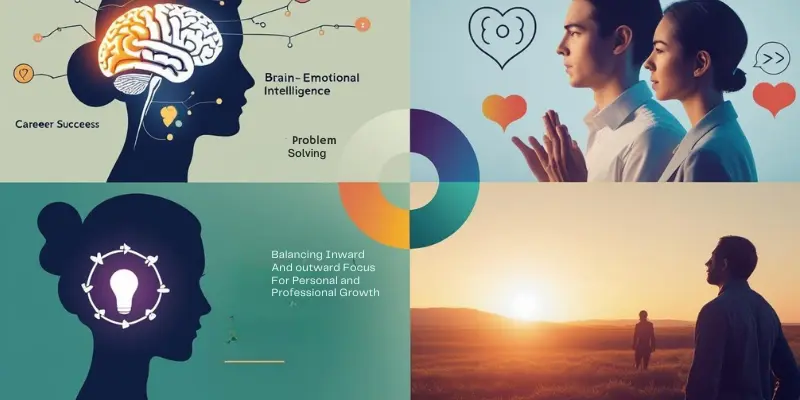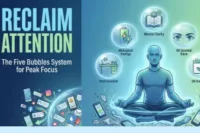Outward Focus in Personal Development: How Balancing Inner Growth and External Impact Drives Success
Published: 19/08/2025
“Do you ever feel like you’re stuck in a loop of self-reflection, yet unsure how to connect meaningfully with others in your personal growth journey?”
It’s easy to get caught up in the cycle of self-improvement, focusing only on your inner thoughts and emotions. Yet, without extending this focus to the people and world around you, progress can feel incomplete. Many professionals struggle with balancing their inner world of self-awareness with the outer world of relationships and external impact. This imbalance can lead to burnout, confusion, or a sense of stagnation in both personal and professional lives.
In this post, we’ll explore how balancing inward focus (self-awareness) and outward focus (empathy and understanding others) can drive holistic personal development. By finding this balance, you can foster both emotional intelligence and meaningful connections—ultimately unlocking deeper personal growth and success in all areas of your life.
What is Outward Focus in Personal Development?
Outward focus is the practice of shifting your attention away from your personal concerns to engage with the experiences, perspectives, and needs of others. In personal development, this means actively understanding how people around you feel, what they need, and how your actions impact them. It’s about broadening your focus to include empathy and interaction, rather than just self-reflection. By developing this outward focus, you deepen your connections, contribute to the well-being of others, and gain new insights that fuel your own growth.
“Outward focus involves shifting your attention from personal concerns to understanding others’ experiences and needs.”
Inward vs. Outward Focus: What’s the Difference?
Understanding the difference between inward and outward focus is key to balancing personal development.
- Inward Focus: This is all about self-awareness—taking time to reflect on your emotions, thoughts, and reactions. It’s the process of understanding your own motivations, strengths, and weaknesses. While inward focus is crucial for emotional intelligence, it can become limiting if not balanced with outward focus.
- Outward Focus: This is about engaging with others—actively listening to their viewpoints, understanding their challenges, and offering support where needed. It’s not just about focusing on your own feelings but extending your attention to the world and people around you. Outward focus helps you connect meaningfully with others, forming stronger relationships and gaining new perspectives.
“Inward focus helps you understand your emotions, while outward focus helps you connect meaningfully with others.”

In short, inward focus helps you grow internally, while outward focus expands your growth externally by connecting with others in a purposeful way.
The Importance of Balancing Inward and Outward Focus
Finding the right balance between inward and outward focus is crucial for personal growth. When these two aspects work together, they create a synergy that drives holistic development.
- Too much inward focus: While self-reflection is essential, focusing solely on yourself can lead to isolation, self-absorption, and even narcissism. You may become overly consumed with your own thoughts and emotions, losing sight of the world around you and your impact on others.
- Too much outward focus: On the flip side, focusing exclusively on the needs and emotions of others, without considering your own, can lead to burnout, a sense of unfulfillment, and a lack of personal boundaries.
Achieving the right balance allows you to stay grounded in self-awareness while also connecting meaningfully with the world. It’s not about choosing one over the other, but about blending both in a way that nurtures you and those around you.
“Too much inward focus can lead to isolation or narcissism, while too much outward focus may leave you feeling unfulfilled.”
Benefits of the Balance
Striking the right balance between inward and outward focus brings a host of personal and professional benefits.
- Emotional Intelligence: A balanced focus helps you understand your own emotions (inward) while also enhancing your ability to empathize with others (outward). This improves your emotional intelligence, allowing you to manage your feelings and interactions better.
- Improved Relationships: Balancing both inward and outward focus strengthens your relationships. It helps you communicate effectively, listen deeply, and understand others’ perspectives without losing sight of your own needs. You become a more empathetic and reliable friend, colleague, or partner.
- Career Success: Professionals who balance inward and outward focus are better at decision-making, problem-solving, and leading teams. They know when to turn inward for self-reflection and when to look outward for guidance, feedback, and collaboration.
- Personal Fulfillment: Ultimately, balancing inward and outward focus leads to a sense of purpose. You feel more aligned with your values and more connected to others. This brings deeper fulfillment in both personal and professional life.

“A balanced approach leads to better decision-making, improved relationships, and a sense of purpose.”
In essence, balancing these two focuses not only enhances your emotional intelligence but also fosters stronger connections with others, propelling you toward a more fulfilling and successful life.
Practical Steps to Cultivate Outward Focus in Your Life
Before you can fully engage with others, it’s essential to understand yourself. Self-reflection helps you recognize your personal values, emotional triggers, and goals. It’s about becoming aware of how you think, feel, and react—providing the foundation for building outward focus.
- Journaling: Dedicate a few minutes each morning to write down your thoughts, feelings, and intentions for the day. This can help you become more aware of your emotional state and how it might influence your interactions with others.
- Mindfulness: Practice mindfulness by taking short moments throughout the day to observe your thoughts and feelings without judgment. This will allow you to better understand your emotional reactions and maintain control over them during conversations.
“Set aside 10 minutes each morning for self-reflection to understand your emotional state and daily goals.”
Shift Your Perspective to Others
Once you have a better understanding of yourself, it’s time to turn your attention outward. Actively shifting your perspective allows you to better engage with others, listen attentively, and offer empathy when needed.
- Active Listening: In any conversation, make a conscious effort to listen fully to what the other person is saying, rather than thinking about your response. This shows that you value their perspective.
- Empathy in Practice: Practice stepping into someone else’s shoes. Whether it’s a colleague, friend, or family member, take a moment to consider their emotions, struggles, and viewpoint before responding.
“Take a moment in meetings to listen fully and engage with others’ viewpoints without immediately offering solutions.”
Practice Active Empathy
Empathy is one of the most powerful ways to connect with others and cultivate outward focus. It’s not just about understanding others intellectually but also connecting with their emotions and offering support.
- Ask Meaningful Questions: Show genuine interest in others’ feelings by asking open-ended questions like, “How are you really feeling today?” Then, listen without rushing to offer advice or solutions.
- Non-Verbal Empathy: Sometimes, showing empathy doesn’t require words. A simple gesture, like a comforting touch or a warm smile, can convey your understanding and support.
“Practice empathy by asking ‘How are you feeling today?’ and truly listening to their response.”
By integrating these practices into your daily life, you will begin to shift your focus from purely inward to outward—building stronger, more meaningful connections with those around you.
Expert Tips for Mastering Outward Focus
Emotional intelligence (EQ) is essential for building strong relationships and connecting with others on a deeper level. It helps you understand your own emotions and respond to others’ feelings with empathy and care. By enhancing your EQ, you can engage more effectively with those around you, fostering stronger personal and professional connections.
- Self-Awareness: Regularly take a moment to check in with your emotions. Before entering any conversation, ask yourself how you’re feeling. This allows you to be mindful of your emotional state and manage your reactions more effectively.
- Self-Regulation: Practice pausing before reacting emotionally. Instead of impulsively responding, take a deep breath and consider the impact of your words. This helps you maintain control in difficult situations.
- Empathy: Put yourself in the other person’s shoes. When engaging with someone, imagine what they might be feeling and try to understand their perspective deeply, rather than just listening passively.
“Regularly check in with your emotional state before interactions to manage your reactions better.”

Be Present and Engaged in Conversations
In today’s fast-paced world, it’s easy to get distracted during conversations. But being fully present in the moment is one of the best ways to strengthen your outward focus. When you give your full attention to the person speaking, it shows respect and fosters a deeper connection.
- Mindful Listening: Focus on what the speaker is saying without letting your mind wander. If your thoughts drift, gently bring your attention back to the conversation.
- Avoid Distractions: Put away your phone or any other distractions. This sends a clear message to the person you’re speaking with that they are your priority.
- Respond Thoughtfully: After listening, take a moment to reflect on what the speaker has shared, and then respond with empathy and understanding. Avoid jumping in with advice unless it’s asked for.
“Focus on the speaker, avoid distractions, and respond thoughtfully to their concerns.”
By developing your emotional intelligence and practicing mindfulness in conversations, you’ll improve your ability to connect with others, creating stronger, more empathetic relationships.
Common Mistakes to Avoid When Balancing Inward and Outward Focus
One of the biggest mistakes people make when balancing inward and outward focus is neglecting their own self-care and personal reflection. It’s easy to get caught up in the needs of others—whether it’s work, relationships, or social obligations—but failing to prioritize your own emotional well-being can lead to burnout and emotional exhaustion.
- Emotional Drain: Constantly giving without taking time to replenish yourself can leave you feeling empty, frustrated, or resentful.
- Lost Connection with Yourself: Without regular self-reflection, you may lose sight of your own values, needs, and boundaries, which affects your ability to engage authentically with others.
Remember, you can’t pour from an empty cup. Taking time for self-care allows you to recharge, reflect, and reconnect with your inner self, ensuring that you’re bringing your best self to the world around you.
“Self-care is crucial. Ignoring your own emotional needs will eventually affect your ability to engage with others.”
Overcommitting to External Validation
While outward focus is about connecting with others, it’s essential to avoid the mistake of overcommitting to seeking approval or validation from external sources. This can lead to neglecting your personal values and emotional needs, eventually causing a sense of dissatisfaction or burnout.
- External Pressure: Constantly seeking approval or trying to meet others’ expectations can make you feel disconnected from your authentic self. You might lose sight of what truly matters to you in the pursuit of pleasing others.
- Boundaries are Key: Setting healthy boundaries is vital. While engaging with others and considering their needs is important, you must also honor your own values and limitations. Without boundaries, you may find yourself overwhelmed, stressed, and unfulfilled.
Maintaining a balance between outward focus and personal boundaries is essential for long-term emotional health and personal success.
“Balance outward focus with personal boundaries to avoid burnout from over-commitment.”
By avoiding these common mistakes and learning to prioritize both inward and outward needs, you’ll achieve a healthier, more sustainable approach to personal development and connection with others.
Conclusion
Balancing inward focus (self-reflection) and outward focus (empathy and engagement with others) is essential for meaningful personal growth and successful relationships. When both are in harmony, they create a powerful synergy that enhances emotional intelligence, strengthens connections, and leads to a deeper sense of purpose. By cultivating awareness of both your inner world and the world around you, you can create a fulfilling, well-rounded life that supports both your personal development and the well-being of those you interact with.
“True growth comes from aligning your internal values with how you engage with the world around you.”
Take the first step today—start practicing outward focus in your daily interactions. Reflect on your emotions, listen deeply to others, and engage with empathy. Track your progress and notice the positive impact it has on your relationships and personal growth.
We’d love to hear about your journey—share your experiences in the comments below and let’s continue the conversation!
Your FAQs on Outward Focus and Personal Development, Answered
Start by practicing self-awareness during breaks, then apply this to your interactions with colleagues.
Yes, by understanding others’ needs and showing empathy, you can deepen connections and resolve conflicts.
Begin by being more mindful of your emotional reactions and practicing active listening in conversations.
Set clear boundaries, practice regular self-care, and ensure you take time for self-reflection. Balancing both focuses means prioritizing your emotional needs while engaging with others in a healthy, sustainable way.
Practice mindfulness by staying present in the moment and being fully engaged during conversations. This helps you listen attentively, understand others’ needs, and respond with empathy and clarity.
Empathy allows you to connect with others on a deeper level, understand their emotions, and offer support. It plays a vital role in personal growth by enhancing relationships and improving emotional intelligence.

- Be Respectful
- Stay Relevant
- Stay Positive
- True Feedback
- Encourage Discussion
- Avoid Spamming
- No Fake News
- Don't Copy-Paste
- No Personal Attacks

- Be Respectful
- Stay Relevant
- Stay Positive
- True Feedback
- Encourage Discussion
- Avoid Spamming
- No Fake News
- Don't Copy-Paste
- No Personal Attacks





